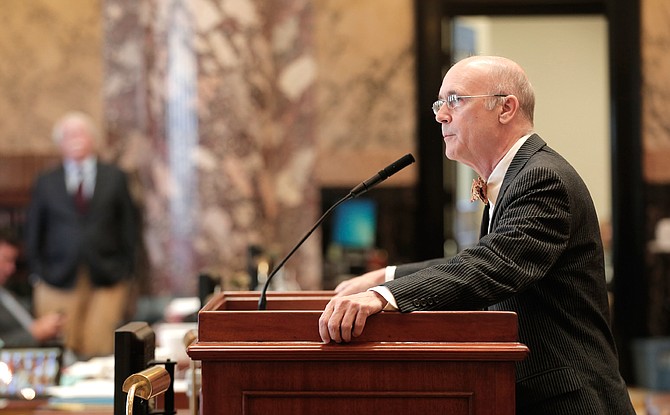Sen. Hob Bryan, D-Amory, says EdBuild's involvement with the state's funding formula is "terrifying." Photo by Imani Khayyam.
There has been much hoopla this legislative session over the 80-page proposal from EdBuild suggesting that Mississippi move to weighted student funding to pay for its public-education system. The Legislature hired the New Jersey nonprofit back in October to create a simulator that hypothetically allows lawmakers to look at the various scenarios they could use to make the Mississippi Adequate Education Program a weighted formula instead.
Not much has happened since the few public hearings last winter and the recommendations presentation early in January—at least publicly. Then last week, the Associated Press published an analysis of EdBuild's plan, saying it could send more state money to nearly 80 percent of the state's school districts. Both Republicans and Democrats cried foul at the analysis.
Democrats, led primarily by Sen. Hob Bryan, D-Amory, pointed out that EdBuild's proposals, which AP based its analysis on, used reduced budget numbers. Republicans, including House Education Chairman Rep. John Moore, R-Brandon, called the AP analysis "an absolute falsehood." Moore's point, made during announcements on the House floor last week, was that the Legislature's proposal "will look significantly different than the consultant's proposal." EdBuild's CEO told the us before the AP analysis was posted that the numbers used in the recommendations were "for example only."
Yes, numbers are important. But in weighted student funding, weights are what really matter. How much funding goes toward each specific measure could easily tip the scales in favor of certain districts—or not—depending on several factors. For example, if lawmakers decide to use a heavier weight for special-education students, districts with large populations of special-education students would hypothetically stand to gain more dollars from the proposal. But that's a big "if."
The real problem with EdBuild lies not with the proposal itself but with the lack of transparency throughout this entire process. In Georgia, after receiving input from EdBuild, lawmakers and other stakeholders on a commission took a whole year to put together a report on suggested weights. In Mississippi, several lawmakers have been left out of closed-door process of using the simulator to determine possible changes. As this went to press, the House Appropriations Committee passed a boilerplate bill for lawmakers to implement some of EdBuild's recommendations. Now it's crucial to pay attention to the weights because small things like changing how the State defines a "low-income" student, for example, could have monumental consequences for education funding down the road.
More stories by this author
- EDITORIAL: Gov. Reeves Needs to Take ‘Essential’ Seriously for COVID-19 Social Distancing
- EDITORIAL: City Needs to Name Officers Who Shot Citizens Without Delay
- EDITORIAL: Free Press Is Not Here to Comfort the Powerful; We're Here for Truth
- EDITORIAL: Dear Mississippi Politicians, Criminal Justice Reform Is More Than Rhetoric
- EDITORIAL: Transparency in Officer Shootings Needs to Improve, Not Worsen


